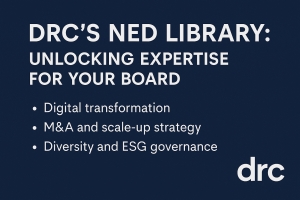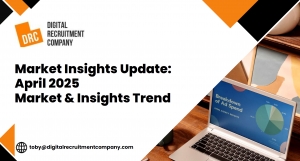Toby Day
"December’s slowdown was expected, but it highlights how differently the contract and permanent markets are behaving. Contract hiring continues to play a critical role as organisations prioritise flexibility and remain cautious about long-term commitments. In the current climate, flexibility has become a strategic requirement rather than a short-term fix.
Permanent hiring has softened at points, yet year-on-year stability shows confidence has not disappeared, it has simply become more selective. Strong conversion rates across both markets suggest that when decisions are made, they are decisive, with quality continuing to outweigh volume despite wider use of AI.
This sits within a broader backdrop where London remains resilient but is clearly at a turning point. Corporate confidence is under pressure, reflected in reduced hiring across professional services and tighter margins in sectors such as hospitality and retail. While London still leads the UK labour market, sustaining that position will depend on adaptability, productivity gains through technology, and a clear focus on quality execution rather than scale alone."
"December’s slowdown was expected, but it highlights how differently the contract and permanent markets are behaving. Contract hiring continues to play a critical role as organisations prioritise flexibility and remain cautious about long-term commitments. In the current climate, flexibility has become a strategic requirement rather than a short-term fix.
Permanent hiring has softened at points, yet year-on-year stability shows confidence has not disappeared, it has simply become more selective. Strong conversion rates across both markets suggest that when decisions are made, they are decisive, with quality continuing to outweigh volume despite wider use of AI.
This sits within a broader backdrop where London remains resilient but is clearly at a turning point. Corporate confidence is under pressure, reflected in reduced hiring across professional services and tighter margins in sectors such as hospitality and retail. While London still leads the UK labour market, sustaining that position will depend on adaptability, productivity gains through technology, and a clear focus on quality execution rather than scale alone."
"October delivered only modest growth in the contract market, with jobs rising by around 1.5% and placements by just over 1% month on month. Both remain comfortably ahead of last year, although delivery did ease slightly which may temper November’s numbers. Even so, the consistent movement in the core indicators points to a broadly positive outlook. The uplift in contract activity also reflects the agility businesses are prioritising in the current climate. With economic uncertainty still in play and workforce expectations shifting, organisations are leaning more heavily on flexible resourcing models to maintain momentum while managing risk.
The permanent market continues to tell a different story. Placements have edged up through the year, but job volumes remain around 15% lower despite stable conditions through 2025. Recruiters are clearly maximising conversion, with stronger delivery helping to improve fill rates. This may also be an early sign of AI-driven gains in efficiency across professional staffing. While permanent hiring is still regaining its footing, the steady rise in placements suggests confidence is gradually returning. Professional staffing firms are central to this recovery, giving organisations rapid access to skilled talent whether they need contract or permanent support."
Many top executives today are lingering in their roles well past their intended exit date – often by two years or more. In fact, recent research shows that over half of C-suite leaders (56%) globally are likely to leave their jobs within the next two years . Some are even accelerating their timelines, with 27% expecting to resign within just 6 months . These eye-opening figures suggest a pent-up desire for change at the top. Why are so many CEOs, CTOs, COOs and CIOs staying on longer than they wanted? And more importantly – so what?
This trend carries significant implications for businesses, especially as the job market flips to favor candidates. Below, we explore why leaders are hanging on, what it means for your organization, and how proactive succession planning (including interim solutions) can turn a potential crisis into a strategic opportunity.
Leaders Lingering Longer Than Expected
Executives often take pride in commitment, but staying too long can become a liability. A new Conference Board report confirms CEOs are indeed remaining in their roles longer than before. For example, succession rates for CEOs aged 64+ dropped by 8% in 2024, meaning boards are replacing far fewer older CEOs than in prior years . Simply put, many veteran leaders are postponing retirement or career moves.
Why the extra two years (or more) at the helm? Common reasons include: waiting for a lucrative bonus payout, seeing the organization through a crisis (e.g. pandemic recovery), lack of a ready successor, or just personal comfort and identity tied to the role. As one CEO quipped, "when I became CEO...my jokes got funnier" – the prestige and influence are hard to give up .
However, when leaders linger beyond their "sell-by" date, organizations may pay the price. Research suggests that long-tenured executive teams can become stagnant, with lower enterprise growth compared to teams infused with fresh talent . The optimal tenure for a chief executive might be shorter than you think – one study found CEO performance peaks at around 5 years, yet average CEO tenures are nearly double that . Executives who overstay can grow insular, less responsive to market shifts . In fast-moving sectors like technology, this is especially risky.
The "So What": Business Impact of Waiting to Leave
When a top leader has mentally checked out but physically remains in the seat, it creates a hidden succession crisis. The cost of an abrupt, unplanned leadership exit can be huge. Consider: nearly half of boards (43%) admit they have no clear data on their risk of losing key executives , and over half of companies (56%) have no formal succession plan in place at all . In these cases, if a long-serving CEO or CTO suddenly resigns (or finally retires), the business can be caught flat-footed.
Some leaders try to time their departure right after annual bonuses or vesting periods – understandable from an individual view, but this often leaves the company in a lurch. The bigger "so what" is the disruption to business: lost momentum, stalled projects, jittery investors and employees. A scramble to fill the void can take months, damaging performance and morale. According to Gartner's analysis, organizations with less-tenured (i.e. newer) executive teams see weaker enterprise performance on key metrics . In a worst-case scenario, a poorly managed transition can even hurt stock price and customer confidence.
All this is unfolding as we rapidly enter a candidate-driven market for leadership talent. After a couple of years of hiring freezes and uncertainty, power is shifting back to candidates. Companies are once again hungry for experienced leaders, and those leaders have options. Nearly 3 in 4 companies worldwide report difficulty filling roles in 2025 – a near-record talent shortage . In the UK (as in the rest of the world), unemployment remains low and critical skill gaps persist. This means when a seasoned executive finally signals they're ready to go, you might find yourself competing to attract a suitable replacement in a fierce talent market. Simply put: if your leader leaves, replacing them won't be quick or easy in today's environment .
In summary, leaders staying longer than planned is a double-edged sword. On one side, continuity can provide stability through tough times. On the other, it can breed complacency – and set the stage for a turbulent exit that the organization isn't prepared for. Every CEO or CTO will eventually leave; the only question is whether it's on your terms or a chaotic surprise.
Creating a Safe Environment for Succession Talks
Given these stakes, business leaders and boards need to ask themselves: Are we fostering an environment where a CEO/CTO/CIO can openly discuss succession before dropping their resignation letter? Too often, the answer is no. Many corporate cultures treat a leader's departure as taboo until it's imminent – especially if that leader fears losing their end-of-year bonus or being seen as a "lame duck."
Yet the most future-ready organizations encourage proactive succession planning and candid conversations. This means a CEO could come to the board and say, "I'm considering moving on next year – let's put the succession plan in motion," without jeopardizing their position or compensation. It requires trust and a mutual understanding that planning ahead benefits everyone. The departing leader can exit gracefully (with due rewards), and the company avoids panic mode.
Unfortunately, only about a quarter of companies treat CEO succession as a top priority . The rest often default to emergency replacements or costly external searches at the last minute. No wonder many executives feel they must keep their departure plans secret. When no formal plan exists, giving early notice can be seen as rocking the boat. It's telling that 56% of organizations have no succession plan at all – a recipe for exactly the scenario we're discussing. Leaders may want to flag their intent to leave 6–12 months in advance, but if the culture doesn't support that, they'll wait in silence (often longer than they wanted) and then leave on their own timetable.
So what can you do? Building a safe succession culture starts at the top. Boards should make succession planning an ongoing agenda item – not a once-a-year checkbox. Executives should be encouraged to cultivate one or more potential successors and to speak up about their own career intentions. You want to know before the bonus checks clear if your CIO has one foot out the door. This doesn't mean forcing anyone's hand; it means treating leadership transitions as a normal, openly-discussed aspect of business continuity.
Consider these questions as a CEO or board member:
Have we identified who could step in if our CEO or other key leader left tomorrow? (If not, you're rolling the dice.)
Do we know what we will truly need in our next leader? For example, will the company's strategy 12–18 months from now require different strengths than the current leader's?
How long would it take to find and onboard a suitable successor? Executive searches can take months, and an internal leader may need grooming – timeframes matter.
What critical skill sets should our future leader possess, given how fast technology and markets are evolving? The profile of an ideal leader today might look very different in a year or two (think digital acumen, AI literacy, etc.).
Being able to answer these questions requires deliberate effort. It might feel uncomfortable at first – almost like planning for a breakup while things are "fine." But it's far better than scrambling when an executive's two-weeks notice hits your desk unexpectedly.
Rethinking Skills and Leadership for a Fast-Tech World
A key part of succession planning is anticipating the skills your next generation of leaders will need. If a seasoned CIO has been in role longer than they wanted, chances are their replacement will step into a very different technological landscape whenever they do take over. As a business leader, ask yourself: Does our succession plan account for the rapid evolution in tech and required skill sets?
Technology is moving blindingly fast, and the shelf-life of skills is shrinking. Nearly 80% of executives say hard skills are now relevant for less than 5 years before becoming outdated . One recent study was even more stark: half of all skills could be outdated within just two years ! Think about that – the tools and expertise that made your CTO successful in 2020 might be obsolete by 2025. From cloud platforms and cybersecurity to AI-driven analytics, the next leader must be equipped for the next wave, not the last.
This doesn't mean your current leadership is ineffective – it means continuous upskilling and fresh perspectives are critical. If a long-tenured leader has delayed leaving, there's a risk the organization is clinging to yesterday's playbook. Succession planning gives you a chance to realign leadership competencies with the future. Many boards are now stipulating that CEO successors have specific digital transformation experience or are adept in emerging tech, because every company is partly a tech company today.
"Do you know what skill sets this person requires in a world where tech moves so fast?" It's a question every company should be pondering. For example, if AI, automation, or data science is disrupting your industry, your next leader (or their leadership team) had better be fluent in those areas. The World Economic Forum forecasts huge shifts in in-demand skills by 2027, including analytical thinking, creative thinking, and technology use/monitoring, while skills like rote management are declining. When planning succession, define the core competencies for the role not just as it is today, but as it will be in 2–5 years. This future-oriented approach ensures you don't just backfill a position, but rather place someone at the helm who can navigate the road ahead.
Finally, don't underestimate soft skills and cultural fit. If a long-time leader is leaving, the cultural ripple effect will be significant. Successors need emotional intelligence and change management skills to unite teams and gain trust – especially if they're stepping in after a highly respected (or very entrenched) predecessor. The goal is not to clone the departing leader, but to identify what new capabilities the business will need for the next chapter.
Interim Leadership: A Bridge to Outcomes
One increasingly popular solution when faced with a leadership gap or a fast-changing skill requirement is to leverage interim executives. If you determine that "the leader we need now is different from the one we'll need 12 months from now," an interim can fill that void effectively. Rather than forcing a square peg into a round hole, you bring in a specialist leader for the current phase, with the understanding that it's a temporary assignment focused on outcomes.
Interim technology leaders (or interim CEOs, CFOs, etc.) can be game-changers in a few scenarios:
When you have a sudden vacancy: If a leader leaves sooner than expected (despite your best plans), an interim executive can step in immediately to maintain stability and keep strategic initiatives on track. This prevents the "interim limbo" where an internal manager does two jobs at once and the team stagnates .
When specific expertise is needed short-term: Perhaps your company is undertaking a major digital transformation, and you realize an external expert is needed to drive it for the next 9–12 months. An interim CTO with exactly the right skill set can lead the charge, while you continue searching for a permanent CTO who will focus on longer-term operations post-transformation.
When the business is in transition: For example, entering a new market, restructuring, or post-merger integration. The leader who excels at steady-state may not be ideal for high-change environments. An interim can carry the torch through the volatility, accomplish the set goals, and then hand over to a permanent leader once the dust settles. As one leadership advisor noted, "the leader you need to drive a turnaround is often not the one you need to sustain once it's complete."
Not long ago, bringing in contract executives had a bit of a stigma – but that's changed. The use of interim executives has surged by nearly 30% over the past decade as organizations recognize the value of flexible, specialized leadership. Companies get immediate expertise without a long-term commitment . Interim leaders are typically overqualified for the role (hit the ground running on day one) and laser-focused on delivering results in their short tenure . They also bring a fresh, unbiased perspective with "no political baggage" , which can be refreshing for teams that have been under one style of leadership for a long time.
Importantly, using an interim doesn't mean you neglect permanent succession. It's a both/and approach: the interim achieves critical outcomes now while you refine the profile and search for the right long-term leader. In a fast-moving tech context, you might even plan a series of leadership handoffs – for example, an interim CIO to execute a cloud migration this year, followed by a permanent CIO next year to focus on optimization and growth. What matters is that business outcomes are met and leadership continuity is maintained throughout.
Conclusion: Lead Your Succession, Don't Let It Lead You
If you're a CEO, COO, CTO, or CIO who feels you've stayed a couple years longer than you intended – you're not alone, and it's nothing to feel guilty about. 40% of stressed-out leaders have even contemplated leaving their roles to improve well-being . The key is what you do next. Ideally, you'll be able to have an honest conversation with your board or team about timing and succession, so you can exit on a high note and ensure the organization thrives after you're gone.
For boards and executive teams, the message is clear: succession planning is not a "later" issue – it's a now issue. Every leadership role will turn over, the only uncertainty is when. Treating succession as a strategic priority can turn it from a potential catastrophe into a seamless transition (even a positive refresh for the company). That means investing time in identifying emerging leaders internally, keeping an eye on industry talent externally, and understanding the evolving demands of the role.
We are entering a period of rapid executive turnover and a talent-driven market. Those companies that plan early, encourage open dialogue, and leverage creative solutions (like interim leadership) will be the ones to navigate the coming wave of transitions without missing a beat. Those that bury their heads in the sand may find themselves with an empty C-suite chair and no plan – a scenario no one wants to face.
Bottom line: Don't let your organization become a cautionary tale of a leader who gave two weeks' notice after bonus day, leaving everyone scrambling. Whether you're in the UK or operating globally, take action now. Ensure you know who and what you need before you need it. The best leaders guide their companies into the future – including guiding them through a well-planned handoff when the time is right. Make succession a continuous conversation, and you'll turn those extra two years at the top from a regret into a well-leveraged advantage for mentoring successors and cementing your legacy. In leadership, as in life, proactive planning beats reactive panic every time.
Sources:
Gartner (via Inc.) – majority of C-suite execs plan to exit within 2 years
The Conference Board – CEOs staying longer; CEO succession rates fell for age 64+ leaders
Exude/SHRM – 56% of organizations have no succession plan in place
SocialTalent/ManpowerGroup – 76% of employers struggling to fill roles (talent shortage)
SIY Global/Forbes – 78% of execs say hard skills <5-year shelf life; 50% of skills outdated in 2 years
ZRG / Institute of Interim Management – use of interim executives up ~30% in decade
HR Dive / DDI – 4 in 10 leaders considered leaving for well-being (looming exodus)
Why Non-Executive Directors (NEDs) Are Critical to Business Success
In today’s climate of digital transformation, complex risk, and evolving stakeholder expectations, boards need more than governance—they need strategic insight. That’s where Non-Executive Directors (NEDs) come in.
Whether you're a high-growth startup preparing for Series B, or an established firm navigating M&A, a skilled NED can add independent judgment, specialist knowledge, and invaluable networks. But finding the right NED? That’s the hard part.
That’s why DRC Search created the NED Library—a powerful resource connecting forward-thinking businesses with seasoned advisory talent.
What Is the DRC NED Library?
The DRC NED Library is a curated network of highly vetted, high-impact Non-Executive Directors, Chairs, and Board Advisors. These individuals bring decades of cross-sector experience in areas such as:
- Digital transformation
- Mergers & acquisitions
- Scale-up strategy
- Diversity and ESG governance
- Data and AI leadership
Whether you're looking for a Chair to steady the ship or a board advisor with deep martech or product knowledge, DRC’s NED Library is built to provide fast, confidential access to the right individuals.
Why Use a Specialist Search Partner Instead of a Big SHREK Firm?
Unlike traditional large executive search firms (“SHREK firms”), DRC’s NED Library offers agility, industry specialism, and transparent value. We don’t rely on generalist databases—we build lasting relationships with senior leaders who understand the pace, complexity and culture of innovation-driven organisations.
Using our NED Library means:
- Faster shortlisting from a live, engaged network
- Expertise in board dynamics for scale-ups and fast-growth firms
- Transparent, tailored pricing based on actual advisory needs
This is not just a database—it’s a strategic advantage.
When Should You Use the NED Library?
Here are scenarios where accessing DRC’s NED Library can give your business a critical edge:
1. You’re Scaling Fast and Need Strategic Oversight
Adding a NED with prior scale-up or exit experience can de-risk your next funding round or help structure internal leadership more effectively.
2. You’re Exploring M&A or International Expansion
An advisor with M&A, PE or global market experience can shape your strategy and credibility before investors or partners even sit down at the table.
3. Your Board Needs Diversity of Thought
If your current board lacks diversity—whether in gender, background, or digital experience—our library includes leaders with experience in modernising governance structures.
What’s Included When You Access the NED Library?
Each NED or Chair in our library has been:
- Personally vetted through interview and reference
- Mapped by sector, specialism, and prior board history
- Available for part-time, interim or permanent roles
We match you based on cultural fit, sector understanding, and growth stage—not just availability. You’ll receive a shortlist with full profiles and optional support on remuneration, onboarding, and role definition.
Why It Works: Our Track Record
From SaaS companies entering new markets, to PE-backed agencies preparing for sale, we’ve placed NEDs who’ve made an immediate impact on board governance, talent retention, and commercial outcomes.
And because we know this is about trust, every client engagement begins with a scoping consultation—free of charge, with no obligation to hire.
How to Access the NED Library
Ready to strengthen your board with expert advisory talent? You can access the DRC NED Library today by completing this quick request form:
Contact Me to discuss a specific NED brief:
???? toby@digitalrecruitmentcompany.com
How to Get Your First NED Role: A Practical Guide for Aspiring Board Members
Securing your first Non-Executive Director (NED) position can seem daunting, but with the right strategy, it is achievable. Whether you are an experienced executive considering a portfolio career or looking to contribute your expertise at board level, understanding how to get your first NED role is key to opening new professional doors.
Below, we break down actionable steps to help you land that first board seat confidently.
Why Consider a NED Role?
Non-Executive Director opportunities are growing, especially as companies seek external advisors to navigate complex market challenges. Beyond prestige, NED roles allow you to broaden your influence, diversify your income, and contribute meaningfully to organisational strategy.
Yet, competition for first-time NED roles is fierce. Knowing how to get your first NED role starts with preparation.
How to Get Your First NED Role: Key Steps
1. Build a Board-Ready Profile
(Supporting keywords: NED skills, board CV, leadership experience)
Before applying for NED roles, assess whether your experience and skills align with boardroom needs. Focus on showcasing:
Strategic leadership experience
Financial literacy
Risk management capabilities
Governance understanding
Tip: Create a board-focused CV, highlighting achievements over operational tasks. If possible, gain experience on committees or advisory boards first.
2. Understand What Boards Are Looking For
(Supporting keywords: board recruitment, NED competencies)
Boards seek diverse perspectives. Financial expertise, regulatory knowledge, technology skills (particularly around cybersecurity and AI), ESG focus, and sector experience are highly valued.
Understanding board dynamics is crucial. Many boards also seek candidates demonstrating:
Independence of thought
Good judgement under pressure
Strong communication skills
Position yourself as a solution to these needs.
3. Grow Your Board Network Strategically
(Supporting keywords: networking for board roles, NED opportunities)
Networking is essential when targeting your first NED role.
Key strategies include:
Leverage LinkedIn: Follow board recruiters and connect with Chairs, NEDs, and CEOs.
Attend Board-Focused Events: Join organisations like the Institute of Directors (IoD) or Women on Boards UK.
Work With a Specialist Recruiter: Agencies like Digital Recruitment Company understand the nuances of board placements.
Remember, many NED appointments happen informally before reaching the public domain.
4. Gain Relevant Experience First
(Supporting keywords: advisory board experience, pro bono board roles)
If you are struggling to secure an immediate paid NED position, consider:
Serving on charity boards
Joining advisory boards for startups
Participating in committees in your current organisation
This builds credibility and shows commitment to governance practices.
5. Tailor Your Approach for Each Opportunity
(Supporting keywords: NED application tips, board interview preparation)
Tailoring your applications for each board is critical. Research the company thoroughly, understand its strategic challenges, and frame how your experience can add value.
Prepare to articulate:
Why you want a NED role (and why now)
What makes you uniquely positioned for their board
How you can complement existing board skills
Final Thoughts: Persistence Pays Off
Learning how to get your first NED role requires patience, strategic planning, and a proactive mindset. Every interaction, application, and committee role builds your path to the boardroom.
Focus on building your credibility, expanding your network, and refining your pitch. Your first NED appointment might take time, but when it happens, it will be the start of a rewarding new chapter in your career.
March delivered a welcome sense of consistency to the hiring landscape, with increases in both permanent and contract placements. While vacancy growth remained moderate, the continued upward trajectory builds on February’s momentum and suggests a cautious return of employer confidence.
A standout trend was the notable improvement in recruiter efficiency — more hires were secured from fewer CV submissions. This indicates tighter shortlists and stronger alignment between candidates and roles, pointing to a shift toward quality-focused recruitment strategies. If sustained, this focus on precision hiring could lay the foundation for a more stable and sustainable recovery as we move into Q2.
That said, global economic headwinds and policy shifts continue to send ripples through the market. While confidence is returning, volatility remains a risk — and businesses should stay agile to navigate what's ahead.
A comprehensive report providing insights into the Technology, Digital, and Marketing recruitment landscape for March 2025. Covers job market trends, salary updates, recruitment challenges, and industry-specific hiring forecasts.
A comprehensive report providing insights into the Technology, Digital, and Marketing recruitment landscape for February 2025. Covers job market trends, salary updates, recruitment challenges, and industry-specific hiring forecasts.
Introduction: The Future of Work is Digital
Technology is evolving at breakneck speed, and the demand for digital and technology skills is higher than ever. With AI automation, cloud computing, and cybersecurity at the forefront, companies are looking for top talent to keep up with rapid digital transformation.
So, what tech skills will be most valuable in 2025? Whether you're a job seeker looking to upskill or a business leader planning your hiring strategy, this list will help you stay ahead of the curve.
________________________________________
1. Artificial Intelligence (AI) & Machine Learning
Why it's in demand: AI is no longer futuristic—it's here, and it's reshaping industries from finance and healthcare to marketing and automation. Businesses need AI specialists who can build, train, and optimize machine learning models.
Key AI & ML Skills Employers Want in 2025
• Natural Language Processing (NLP) – AI chatbots and voice assistants are booming.
• Generative AI Development – Tools like ChatGPT are just the beginning.
• Deep Learning & Neural Networks – The foundation of AI-driven innovation.
• AI Ethics & Explainability – Companies need AI models that are fair and transparent.
Pro Tip: Want to future-proof your career? Learn Python, TensorFlow, and OpenAI APIs to work on cutting-edge AI projects.
________________________________________
2. Cybersecurity & Ethical Hacking
Why it's in demand: Cyber threats are getting more sophisticated, and businesses can't afford to be vulnerable. From ransomware attacks to data breaches, companies need cybersecurity professionals to safeguard their systems.
Top Cybersecurity Skills for 2025
• Penetration Testing & Ethical Hacking – Find security flaws before hackers do.
• Cloud Security – As businesses move to AWS, Azure, and Google Cloud, securing them is critical.
• Zero Trust Architecture – The new gold standard in network security.
• Compliance & Risk Management – Regulations like GDPR and CCPA demand expert oversight.
Did You Know? Cybersecurity roles are expected to grow by 35% by 2030—one of the fastest-growing sectors in tech.
________________________________________
3. Cloud Computing & DevOps
Why it's in demand: 80% of businesses will move their operations to the cloud by 2025. Whether it's AWS, Azure, or Google Cloud, companies need experts who can build scalable and secure cloud solutions.
Cloud & DevOps Skills Employers Want
Cloud Architecture & Infrastructure – Design scalable cloud environments.
Containerization & Kubernetes – Deploy applications efficiently.
CI/CD Pipelines & Automation – DevOps is all about speed and efficiency.
FinOps (Cloud Cost Optimization) – Save companies millions by managing cloud spending.
Pro Tip: Mastering Terraform, Kubernetes, and Docker will make you a hot commodity in 2025's job market.
________________________________________
4. Data Science & Analytics
Why it's in demand: Data is the new oil, and companies that can extract insights from data will have a competitive edge. Data science is key in finance, marketing, e-commerce, and AI-driven decision-making.
Top Data Skills to Learn in 2025
• Big Data Processing (Hadoop, Spark) – Handle massive datasets.
• Predictive Analytics & AI Integration – Make data-driven decisions.
• SQL & NoSQL Databases – Organize data efficiently.
• Data Visualization (Tableau, Power BI) – Turn numbers into insights.
Did You Know? 90% of the world's data was created in the last two years alone—and it's only growing.
________________________________________
5. Blockchain & Web3 Development
Why it's in demand: Decentralized finance (DeFi), NFTs, and smart contracts are revolutionizing industries. Even traditional banks and fintech companies are integrating blockchain to improve security and transparency.
Key Blockchain Skills to Develop
Smart Contracts (Solidity, Rust) – Automate trustless transactions.
DeFi Development – The future of finance without middlemen.
Blockchain Security – Prevent fraud and exploits in Web3 projects.
Tokenomics & Crypto Strategy – The foundation of digital economies.
Pro Tip: While blockchain had ups and downs, it's still a game-changer—especially in finance and supply chain management.
________________________________________
6. UI/UX Design & Product Management
Why it's in demand: Great tech products aren't just about functionality—they need amazing user experiences (UX) to stand out. Companies need UX designers and product managers who understand user behaviour and digital psychology.
Must-Have UI/UX & Product Skills
User-Cantered Design (UCD) – Build intuitive and engaging products.
Mobile-First & Responsive Design – Optimize for mobile users.
A/B Testing & Conversion Optimization – Improve user engagement.
Agile Product Management – Align teams to deliver high-impact features.
Did You Know? A well-designed UX can increase conversions by up to 400%. If you're in fintech, a seamless user experience is non-negotiable.
________________________________________
Final Thoughts: How to Stay Competitive in 2025
The digital and technology landscape is evolving fast—and companies are hiring for skills, not just degrees.
???? If you're a job seeker, focus on upskilling in these high-demand areas.
???? If you're a hiring manager, make sure your team has the right mix of technical expertise and adaptability.
???? If you're looking for top tech talent, partnering with a specialist recruitment agency can help you access the best candidates before your competitors do.











